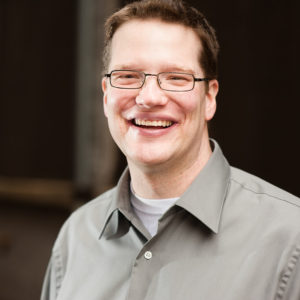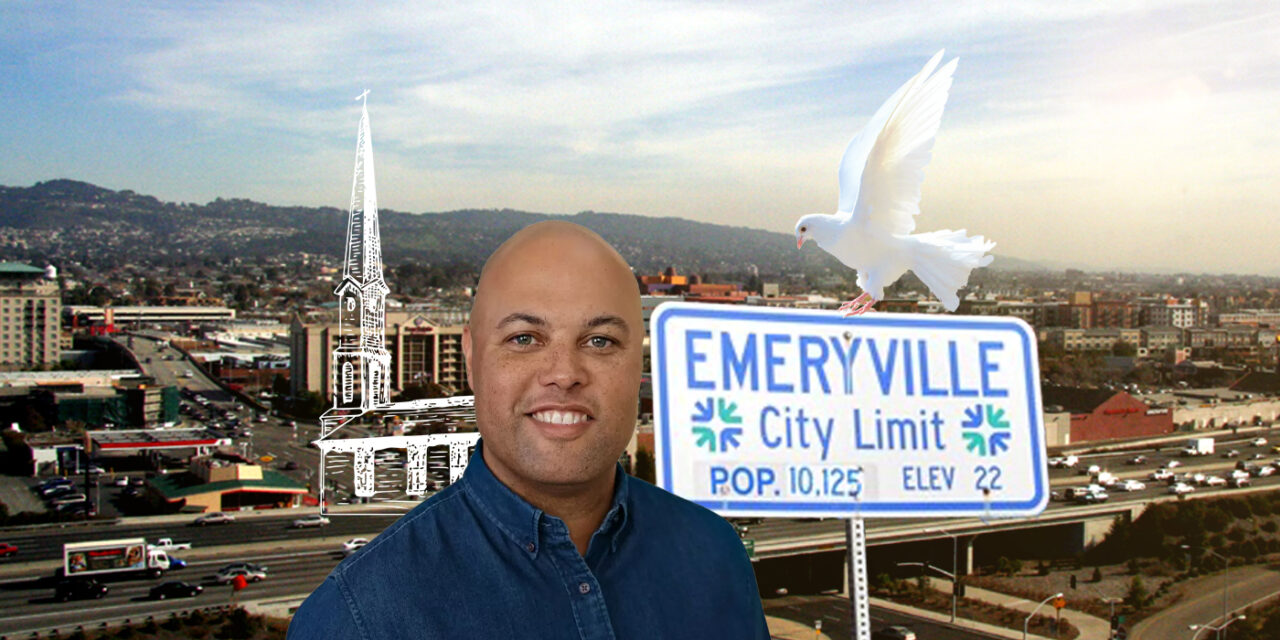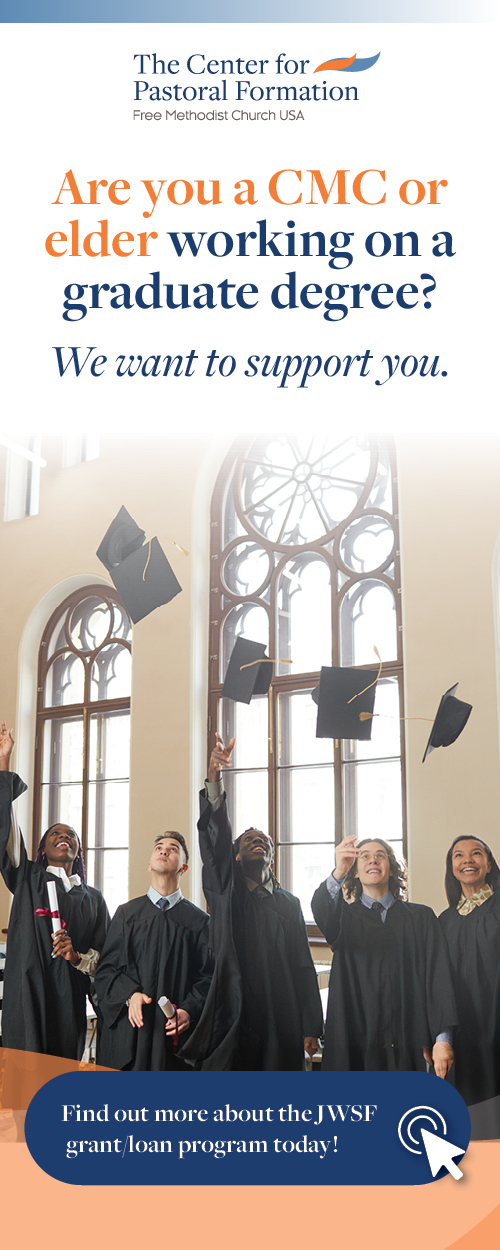A Light+Life Podcast
With guest Benjamin Robinson
Hosted by Brett Heintzman

Jeff Finley
Light + Life Executive Editor
Jeff Finley is this magazine’s executive editor. He joined the Light+Life team in 2011 after a dozen years of reporting and editing for Sun-Times Media. He is a member of John Wesley Free Methodist Church where his wife, Jen, serves as the lead pastor.
by Jeff Finley
Before God called him to plant Lineage Church, Benjamin Robinson served as the worship pastor at a large church in the San Francisco Bay area.
“It was growing and exploding. It was a wonderful time to be a part of that church,” Robinson said in a conversation with Brett Heintzman on a new episode of “The Light + Life Podcast.” “The senior pastor at that church encouraged me in ways that I had not been encouraged before. He gave me a platform to preach at the church, affirmed me as a preacher, and built me up and encouraged me in my preaching in a way that was really important for what God had in store for us next.”
One weekday morning in 2004 at a staff prayer meeting with approximately 25 colleagues, Robinson had an unexpected revelation.
_
“I’m sending you out.”
_
“I had my list of things to pray for the church, but as soon as I hit my knees, the Lord spoke to my heart and said, ‘I’m sending you out,’” Robinson recalled. “I said, ‘Whoa.’ I wasn’t expecting that. I wasn’t praying for that. I wasn’t asking for that. It was just the Lord sovereignly saying, ‘I’m sending you out.’”
He prayed, “Lord, I don’t know what You have in store, but my answer to You is always yes. My life is not my own. I’ve been bought with a price, so, wherever You would have me to be, I’ll go.”
That revelation happened around the same time he was recording a music album with an engineer in his hometown of Oakland, and it was soon followed by another unexpected experience.
“I know Oakland, California, and I’d been working with this guy for months, but for some reason, this particular morning, I’m driving into Oakland to go to this guy’s studio, and I get lost,” he said. “I’m getting more and more frustrated because I’m going in circles here, and I can’t find the guy’s street.”
He then turned and passed a roadside sign stating, “Welcome to Emeryville.”
“As soon as I see that sign ‘Welcome to Emeryville,’ my car is just filled with the presence of God,” he said. “The atmosphere changes inside the vehicle, and the Lord says, ‘Go to Emeryville,’ so I never make it to the studio that morning. I drove through every street of the city of Emeryville, and I prayed over that city.”
Emeryville is a small town of approximately 10,000 residents bordering the larger cities of Berkeley and Oakland.
“It’s 1.25 miles in diameter. You can walk the city of Emeryville in 30 minutes,” he said. “But it was so clear to me that God was saying, ‘This is the place.’”
Robinson began going to Emeryville every morning to walk street-by-street praying for the city.
“I didn’t tell my wife. I didn’t tell anybody,” he said. “For 10 days, I fasted, and I walked every street of that city, and I prayed.”
The next month, he and his wife, Sunhee, traveled to Virginia for a residency period for a doctoral program in renewal theology. He hadn’t wanted to tell his wife about God leading him to Emeryville until he knew the next step, but he went ahead and opened up one night while they discussed their desire to honor God and do His will for their lives.
“I told her what the Lord did, and she got so excited, and so now we’re fasting and praying together for a few days,” he said. “I realized the next step was to tell our pastor.”
When they told their pastor, Robinson recalled, the pastor “basically felt like the Lord was calling us to it immediately, like the next Sunday. He called us up on the platform and said, ‘We’re sending them out.’ He prayed a prayer over us, and he said, ‘Go with God.’”
The Robinsons were still in their 20s and had no idea how to plant a church.
“All we knew how to do was pray,” he said. “We’re praying, and I felt like the Lord said, ‘Go to Emeryville and find an auditorium and rent it, and I’ll find the people.”
Robinson had trouble finding any auditoriums, so he signed a contract to rent space at a Holiday Inn hotel for $2,000 each Sunday.
“We had zero money. We had zero people,” he said. “It was a moment of ignorance that bordered on stupidity, but I signed this contract. I obligate us now to this $8,000 [monthly] bill with no people and no money, but, sure enough, the Lord sent the people. From day one, the people flooded in, and we launched with about 200 people.”
After the first service, however, he felt overwhelmed with discouragement and shame while eating with his family at a restaurant, and he walked outside.
_
“Son, I am with you, and I will not leave until I fulfill all of my purpose for you, and I will not let you fail.”
_
“The enemy’s just whispering in my ear, ‘You failed. This thing failed. It’s not going to work. … None of those people are coming back,’” he recalled. “The Lord came behind me in a wind, and it was like I could feel arms of wind wrap around me, and He held me close, and He started to whisper in my ear, ‘Son, I am with you, and I will not leave until I fulfill all of my purpose for you, and I will not let you fail.’”
He felt supernatural encouragement and strength, which was needed in the days to come. Robinson explained, “That first year was tough. We started [Jan. 4] with about 200 people, and I preached it down to about 59 people by Easter Sunday of that year.”
Missional, Multiethnic, Moved by the Spirit
Unlike many church plants, the church didn’t begin with a vision statement, a mission statement, or a list of core values. However, Robinson said he knew God was calling the church to be missional, multiethnic and charismatic (“open to the moving of the Holy Spirit”).
The missional aspect included the Robinsons already having a heart for Indonesia where he’d attended a pastors’ conference the previous year. On Dec. 26, 2004, an Indian Ocean earthquake and tsunami caused massive damage and killed more than 130,000 people in Indonesia (and nearly 230,000 across multiple Asian countries), and he began inquiring about how to get to Indonesia and help. Two months later, Robinson received a call on a Friday saying that if he could get to the country’s capital of Jakarta by Monday, he would be able to reach the heavily damaged city of Banda Aceh that normally couldn’t be accessed by outsiders.
After five hours of standing at the airport in Jakarta, a stranger approached him and asked, “Are you Pastor Benjamin? Come with me.” He and two other pastors were then taken to Banda Aceh on the island of Sumatra where most residents are Muslims.
“It was insane to see that this whole city had been flattened. We went into the refugee camps,” he said. “We came in, and we brought generators, lights, food, clothing, menstrual products for the women, and so forth. We sat with the elders. It was an incredible ministry. Then we went church to church. There are only five churches in the city of Banda Aceh; it’s under Sharia law. The crazy thing was not a single Christian died in the tsunami. We went to all five churches, and all of them had the same testimony; none of them lost a single member.”
_
“We’re a missional church for the kingdom of God.”
_
The church sent multiple teams around the world, and Pastors Benjamin and Sunhee Robinson were gone for months of the year on missions trips. People told them, “Your church could grow so much more if you stayed home and focused on your church.” They replied, “We’ve got to be obedient to God, and this is the calling. This is the identity of our church. We’re a missional church for the kingdom of God.”
Their church has never had a predominant ethnic group, and the church staff reflects racial and ethnic diversity.
“I am a multiethnic individual,” Benjamin Robinson said. “I personally am half Black — about 50% African American. Culturally, I identify as African American. That was the culture that I grew up in, but, for instance, my [maternal] grandmother was Black; her husband was half-Irish, half-Cherokee.” He added that his father had both French and Black ancestors, “so there’s a lot of mixture in our family.”
Sunhee Robinson was born in South Korea and moved to the United States at age 10.
“Being a multiethnic church was something that we couldn’t figure out how to try to do it. We knew the Lord was calling us to it,” Benjamin Robinson said. “Maybe because my wife and I are a multiethnic couple, we naturally drew a multiethnic congregation.”
The church’s worship unites the diverse participants while including individual elements from different cultural expressions. He explained, “What we’ve been working on doing is creating a coherent worship expression around that diversity.”
_
“Everything we see in the Bible is relevant for today.”
_
He grew up in a Pentecostal church, and his wife grew up in a Presbyterian church, and he noted that “the whole distinction between charismatic and non-charismatic believers never made any sense to us, because there’s only one Bible. … Everything we see in the Bible is relevant for today. What He did then, He can do now.”
He said that unlike his childhood church that focused on the gift of tongues, “the core gift that we’ve primarily sought has been the healing gift. What’s crazy is we’ve gone through long seasons where we don’t see any miracles, and then, all of a sudden, a season opens up, and there’s this breakout of miracles.”
While showing a recap video of a mission trip that included the healing of a woman who ran after previously not being able to stand, he recalled, “all of a sudden three rows behind us, I hear weeping — people breaking out into weeping. I’m thinking, ‘Oh wow, they’re really being impacted by this video.’ One of the ushers comes and whispers in my ears, ‘Pastor, the reason why the people behind you are weeping is because their friend they brought with them to church today was blind when she came in, but now she’s saying she can see.’”
The woman told him that her vision had been blurry, but she could now see clearly. She began weeping as she described what was on the screen. He reflected, “Nobody laid hands on her. Nobody asked God to do it. God just sovereignly did it.”
The church strives to create an atmosphere in which God would be pleased to work. He said, “What we don’t want is any type of manipulation or us trying to force something to happen.”
New Identity and Connection
The congregation previously was known as Living Hope Christian Center but changed its name to Lineage Church after a challenging period when serious medical issues led to three hospital stays for Benjamin Robinson, and divisions occurred within the church family.
“There were so many changes that happened between Jan. 1, 2019, and today — 2018 was the worst year of our lives, both my wife and myself. It was a terrible year for our ministry,” Robinson said. “We went through somewhat of a church split, and there was a lot of pain and some lost relationships.”
A spiritual mentor, Pastor Robert Daniels, called him at the end of 2018 and said, “Benjamin, in 2019, God is going to lead you in a way that you have never gone, and He’s going to bring things before you that you have never anticipated, and if you’re not careful, you’re going to say no to the call of God and the purpose of God in your life. The word of the Lord to you in 2019 is: Do not quickly say no to anything.”
Another longtime friend and mentor, Pastor Mike Chong Perkinson, called Robinson about an available Free Methodist Church building in El Cerrito, California.
“Moving out of Emeryville and joining a denomination were two things that were not on my radar at all, and so I started to say no,” Robinson said.
However, he remembered Daniels’ call, and he agreed to meet with then-Superintendent Jason Garcia of the Pacific Coast Japanese Conference. After a “three-month process discerning with my wife and with our elders, we sensed very clearly that God was calling us to join the Free Methodist Church. I still had no indication that He was calling us to move to El Cerrito, so I said yes to the FMC but no to the property.”
At the conference’s Recalibrate 2019 event, Garcia gave Robinson the keys to the El Cerrito building and told him to use it for a library or an outreach center even if the congregation didn’t want to relocate from Emeryville.
“It felt more like a burden than a blessing at the time,” said Robinson, who subsequently felt like Recalibrate speaker Tim Lucas was preaching directly to him. “It just hit me. My whole staff’s there, and I said, ‘I think the Lord may be calling us to move to El Cerrito,’ and when I said that, I fell apart.”
_
“If you let Me lead you in, then let Me lead you out.”
_
He cried because he had thought moving from Emeryville would be disobedient to God’s call. Then, Robinson said, “the Lord spoke to me and said, ‘Did you ever ask Me to send you to Emeryville? … If you let Me lead you in, then let Me lead you out.’ I realized that my confidence had shifted from following God and being where God would have me to be to being in Emeryville.”
When he shared this revelation with other church leaders, they replied, “Thank God. We’ve been praying for God to show you.” They had sensed God calling them to the El Cerrito site before Robinson heard from God.
What he had already sensed was God calling the church to adopt a new name, but he was concerned that church members would see a new name as a betrayal — especially at the same time the congregation was moving to a new city. He met with core leaders and discussed a potential name change.
The name Lineage already was familiar because the church had been holding yearly all-church Lineage Retreats. The Lineage name is based on the “whole concept of a living legacy. It’s not about the avant-garde, the new thing, the new breed, the new generation,” he said. As Psalm 145:4 states, “One generation commends your works to another; they tell of your mighty acts.”
“There’s this accountability and responsibility to what has come before but also an accountability and responsibility to what is coming after,” he said. “We speak often of the fathers of the faith and the mothers of the faith.”
FMF Makes the Difference
Lineage Church brought in a Free Methodist leader, Reach Conference Superintendent and Timberlake Church Lead Pastor Ben Sigman, as a consultant. The church had more than $1 million in the bank and $700,000 saved in a building fund, but the El Cerrito church building needed approximately $3 million in improvements. Sigman recommended that Lineage connect with FMF Financial Services that oversees the Free Methodist Investment & Loan Fund.
“As an independent church for 16 years, we had looked into various ways to try to borrow money to do a build-out. We couldn’t find a lender that would work with us. Lending organizations don’t like to lend to churches,” Robinson said. “It’s super risky for lenders.”
Sigman wasn’t the only Free Methodist leader recommending FMF. When Lineage joined the denomination, Centerpoint Church Lead Pastor John Hansen — a seminary friend — sent him and FMF’s Joshua Adams an email introducing them to each other. Less than a year after that email, Robinson said, “I got on the phone with Josh and told him all about our church, and they fast-tracked us through the whole process. It was amazingly easy. Of course, we had to send them our financials and all of that, but they made a way for us to complete this project.”
Robinson said the service on March 15, 2020 — the last Sunday gathering before the COVID-19 shutdown — included people “coming to the altar making their commitments, putting their pledge cards down at the altar. The altars are packed full of people. There’s tears in eyes. We’re praying. We’re worshipping the Lord.”
Then services shifted online, but giving continued and doubled in 2020 after a record year of giving in 2019. Because of the time needed for design and permits, the project didn’t break ground until May 2021, and it was completed by December 2021.
_
“The Spirit of God is moving, and people are receiving Jesus for the first time.”
_
“On Dec. 12, we had our grand opening services, and it was amazing. It was absolutely marvelous,” Robinson said. “The people came from the neighborhood and the surrounding communities. We packed out every room in that building, and I’m looking at the newcomers, and the Spirit of God is moving, and people are receiving Jesus for the first time.”
Instead of renting space at a community center in Emeryville, the nearly 18-year-old church finally had its own building. Because mobile churches typically decline or die if they don’t get their own building after a decade, Robinson said, FMF “in a lot of ways saved the life of our church.” +

Jeff Finley
Light + Life Executive Editor
Jeff Finley is this magazine’s executive editor. He joined the Light+Life team in 2011 after a dozen years of reporting and editing for Sun-Times Media. He is a member of John Wesley Free Methodist Church where his wife, Jen, serves as the lead pastor.









